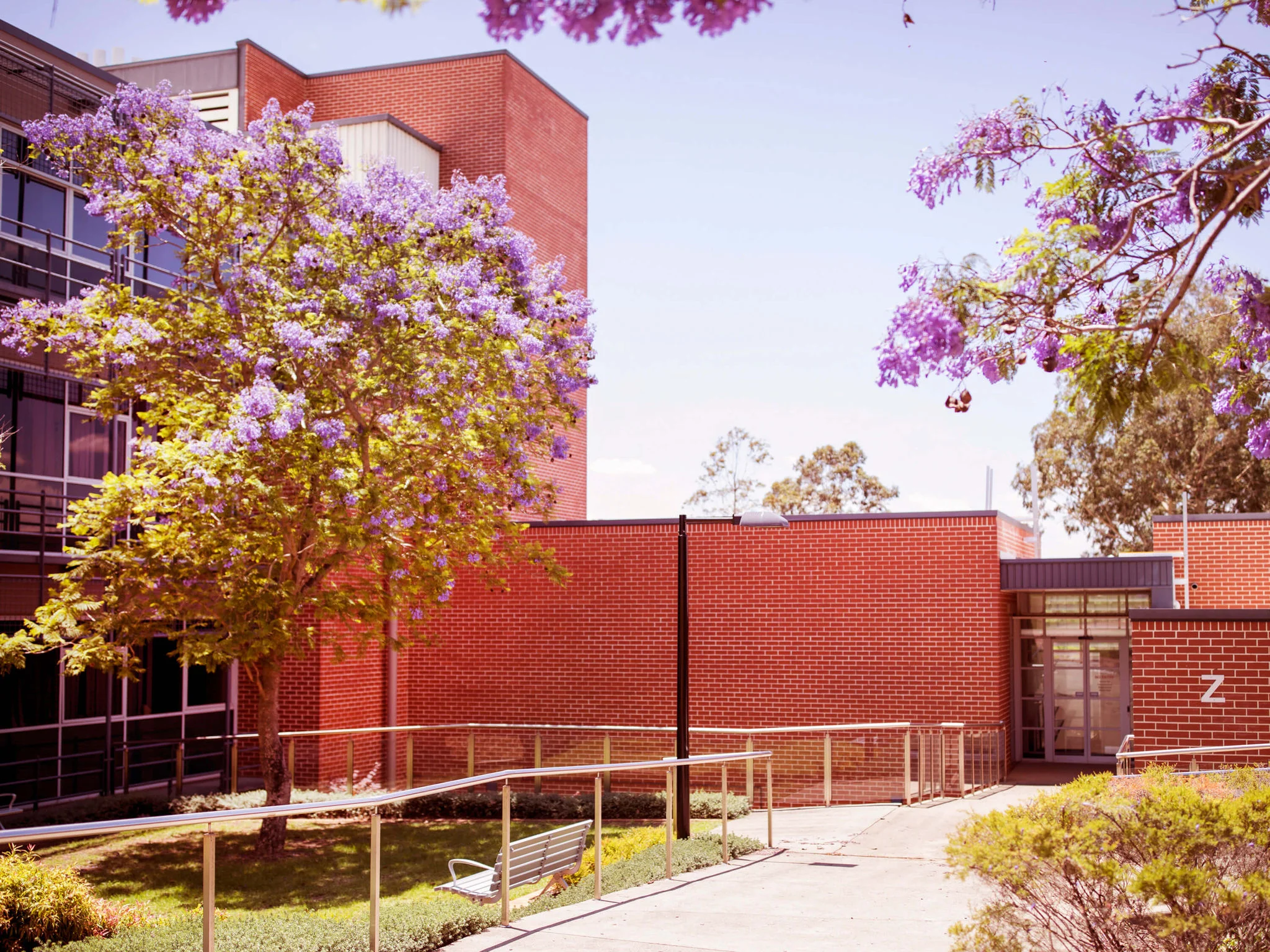This double degree will enable you to be multi-skilled in Information and Communications Technology and Law, giving you increased marketability in these diverse career fields. The Bachelor of Information and Communications Technology degree enables students to gain skills in a practice-based learning environment, to be introduced to real-world project experience, and to acquire knowledge of information and communications technology theory. The Bachelor of Laws program satisfies the academic degree requirements for admission to practice as an Australian lawyer. Students will engage in collaborative face-to-face problem and case-based learning, will be supported by online learning materials, and will participate in authentic assessment to develop knowledge and skills.
Information and Communications Technology and Laws at Western
As an Adobe Creative Campus, Western Sydney University gives all students complimentary access to the Adobe Creative Cloud, so you can level up your digital skills with FREE access to the Adobe Creative Cloud apps. It's like your very own innovation toolkit, where technology meets creativity!
Adobe Creative Cloud is a comprehensive suite of software tools and services which provide a one-stop platform for professionals and enthusiasts in various creative fields, offering a wide range of applications for graphic design, video editing, web development, photography, and more!
Our graduates from this program are eligible to apply to the Legal Profession Admission Board for admission to legal practice in NSW after undertaking prescribed practical legal training.
The Bachelor of Information and Communications Technology is accredited with the Australian Computer Society (ACS) at Professional level.
What you can expect to study
The program structure is outlined in our handbook. Here you can view all of the subjects you will be studying.
Career Opportunities
As a graduate of this degree, you can look forward to a broad range of exciting career opportunities in different sectors and industries. Below are some examples of the possible careers you can pursue with this degree:
- Business strategy and planning
- IT systems architecture
- Digital content production
- Mobile application development
- Accountancy
- Taxation
- Insolvency
Entry requirements for domestic students
Applicants who have undertaken studies overseas may have to provide proof of proficiency in English. Local applicants who are applying through the Universities Admissions Centre (UAC) will find details of minimum English proficiency requirements and acceptable proof on the UAC website. Local applicants applying directly to the University should also use the information provided on the UAC website. Find out more here.
Admission
- Assumed knowledge: HSC Mathematics and any two units of HSC English (or equivalent)
Special Requirements Prerequisites
Students enrolling in these subjects may need to have a National Police Certificate and consent or prohibited employment declarations as they may be conducting their placement in circumstances where they work with minors. This would be managed on an as needs basis:
- LAWS 3074 Judicial Internship
- LAWS 4017 Access to Justice Clinic
- LAWS 3077 Legal Internship
- LAWS 4012 First Nations Peoples' Access to Justice Clinic
- LAWS 3080 Street Law Clinic
- JUST 3011 Issues in the Criminal Justice System (corrective services field trip requirement) also records and identity check.
The following subjects require a visa for the relevant country and the ability to travel at specified time:
- LAWS 3024 Foundations of Chinese Law
- LAWS 3025 Law, Culture and Entrepreneurial Innovation in India
- LAWS 3078 Legal, Economic and Social Transformation in Taiwan
Please consult the handbook for more information.
Entry requirements for international students
**The Part-time option is not available to International Students on a Student Visa.
Applicants who have undertaken studies overseas may have to provide proof of proficiency in English. Local applicants who are applying through the Universities Admissions Centre (UAC) will find details of minimum English proficiency requirements and acceptable proof on the UAC website. Local applicants applying directly to the University should also use the information provided on the UAC website.
International students currently completing an Australian Year 12 in or outside Australia, an International Baccalaureate in Australia or a New Zealand National Certificate of Educational Achievement (NCEA) level 3 must apply via UAC International.
All other International applicants must apply directly to the University via the International Office.
International students applying to the University through the International Office can find details of minimum English proficiency requirements and acceptable proof on their website.
Overseas qualifications must be deemed by the Australian Education International - National Office of Overseas Skills Recognition (AEI-NOOSR) to be equivalent to Australian qualifications in order to be considered by UAC and Western Sydney University.
Admission
- Assumed knowledge: HSC Mathematics and any two units of HSC English (or equivalent)
Special Requirements Prerequisites
Students enrolling in these subjects may need to have a National Police Certificate and consent or prohibited employment declarations as they may be conducting their placement in circumstances where they work with minors. This would be managed on an as needs basis:
- LAWS 3074 Judicial Internship
- LAWS 4017 Access to Justice Clinic
- LAWS 3077 Legal Internship
- LAWS 4012 First Nations Peoples' Access to Justice Clinic
- LAWS 3080 Street Law Clinic
- JUST 3011 Issues in the Criminal Justice System (corrective services field trip requirement) also records and identity check.
The following subjects require a visa for the relevant country and the ability to travel at specified time:
- LAWS 3024 Foundations of Chinese Law
- LAWS 3025 Law, Culture and Entrepreneurial Innovation in India
- LAWS 3078 Legal, Economic and Social Transformation in Taiwan
Please consult the handbook for more information.
Indicative annual fee
A Commonwealth Supported Place (CSP) is one that is subsidised by the Commonwealth and applicable only to Domestic students. This means that the Australian Government pays part of your fees towards your program, therefore reducing your program fees, and the remaining amount is paid by you, this is considered your Student Contribution.
The fee estimates provided are indicative only and subject to change. These estimates are based on the current fee structures for a normal full time study load. However, the final fees may vary depending on several factors, including the specific subjects chosen, the duration and timing of study, and annual fee adjustments (subject to Commonwealth student contribution band rates). Please note that these estimates do not include the Student Services and Amenities Fee. We encourage all prospective and current students to consult with our Student Services Hub for the most current fee information.
As a multi-campus institution, Western Sydney University and its entities reserves the right to alter the location of its programs between campuses and other locations as necessary.
To work out how much your Student Contribution will be before you study, you will first need to find out the Student Contribution band your subjects fit into based on their general discipline area.
You can then calculate your student contributions to work out the total amount of your contribution.
The Higher Education Loan Program (HELP) is a range of loans introduced by the Australian Government from 2005 to provide fee payment assistance to eligible students. Loans are for Australian citizens studying in Australia or overseas. Permanent residents who hold a humanitarian visa are also eligible if studying in Australia.
If eligible you may be able to defer all or part of your Student Contribution through the HECS-HELP loan program. You may also be eligible for OS-HELP if undertaking studies overseas.
New Zealand citizens and holders of an Australian permanent resident visa (other than an Australian permanent humanitarian visa) are generally not entitled to HECS-HELP assistance. If you are a New Zealand citizen or permanent resident your Student Contribution amount must be paid in full by the census date.
However, the Australian Government has passed new legislation that changes the way some New Zealand citizens, who hold a Special Category Visa (SCV), studying in Australia will pay their fees. More information is available on the Changes to fees for New Zealand Citizens webpage.
Apply as a Domestic Student
If you are a domestic student, you can apply through our Western Application system which is free of charge.
Domestic students are:
- Australian Citizens
- New Zealand Citizens
- Australian permanent residents
- Australian permanent humanitarian visa holders
Scholarships
Western Sydney University recognises and rewards students who demonstrate community engagement, outstanding academic ability and superior leadership skills. Donor-funded scholarships are also available, providing support for students based on both academic achievements and equity considerations. There are also scholarships available for specific degrees.
The fee estimates provided are indicative only and subject to change. These estimates are based on the current fee structures for a normal full time study load. However, the final fees may vary depending on several factors, including the specific subjects chosen, the duration and timing of study, and annual fee adjustments (subject to Commonwealth student contribution band rates). Please note that these estimates do not include the Student Services and Amenities Fee. We encourage all prospective and current students to consult with our Student Services Hub for the most current fee information.
As a multi-campus institution, Western Sydney University and its entities reserves the right to alter the location of its programs between campuses and other locations as necessary.
Apply as an International Student
If you are an international student, you can apply for free through our international student application system or through an agent representative.
International students are:
- Not an Australian citizen;
- Not a New Zealand citizen; and
- Not a permanent resident of Australia.
If you are an international student completing the Australian HSC, IB or NCEA, apply direct via UAC International.
Admission to Western Sydney University is on the basis of meeting minimum academic and English language requirements. For more information about tuition fees and other costs, visit the Fees and Costs page.
Scholarships
When you apply to Western, you’re automatically assessed for a Scholarship, no additional application required! We’re offering multi-year scholarships (for up to 3 years) valued at $6,000 or $3,000 and even 50% off tuition fees. Scholarships are awarded on academic merit.
Want to know more?
We're here to provide clarity.
If you're uncertain about your study journey, enquire about our program today and gain the confidence to move forward.
Australian students
1300 668 370
International students
+61 2 9852 5499

The fee estimates provided are indicative only and subject to change. These estimates are based on the current fee structures for a normal full time study load. However, the final fees may vary depending on several factors, including the specific subjects chosen, the duration and timing of study, and annual fee adjustments (subject to Commonwealth student contribution band rates). Please note that these estimates do not include the Student Services and Amenities Fee. We encourage all prospective and current students to consult with our Student Services Hub for the most current fee information.
As a multi-campus institution, Western Sydney University and its entities reserves the right to alter the location of its programs between campuses and other locations as necessary.






